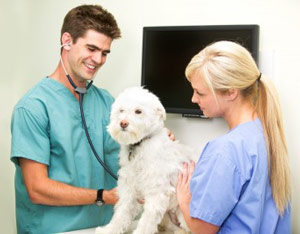Originally published, September 5, 2014
 Regular visits to your dog’s veterinarian are an essential part of life if your dog is to remain healthy. Your dog will need a regular check-up and routine inoculations at the minimum, and dealing with health issues or accidents as the need arises. Getting your dog to the vet and answering the questions are tough enough but if your dog is feeling stress at the same time, it can be a really unpleasant experience for both of you (and the vet – and everyone else in the facility!) Wouldn’t it be much better to have your dog enjoy, even looked forward to his regular veterinarian visits?
Regular visits to your dog’s veterinarian are an essential part of life if your dog is to remain healthy. Your dog will need a regular check-up and routine inoculations at the minimum, and dealing with health issues or accidents as the need arises. Getting your dog to the vet and answering the questions are tough enough but if your dog is feeling stress at the same time, it can be a really unpleasant experience for both of you (and the vet – and everyone else in the facility!) Wouldn’t it be much better to have your dog enjoy, even looked forward to his regular veterinarian visits?
Preparation Avoids Stress
The first step is getting there. If you have a puppy it’s probably not an issue, if you have adopted an older dog her history may cause her to not like riding in your car. Also, if the only time she rides is to go to the vet, and past vet visits were unpleasant, then she will associate riding with an unpleasant destination. Dissipate any stressful associations by taking her riding to pleasant places: a park for a walk, or to a dog-friendly store to do some shopping, if you haul trash to a collection center, take the dog with you. Do NOT take the dog if you will leave her locked in your car while you go inside, especially if it’s warm out. The purpose of the outing is for your dog to have fun with you while riding or immediately after riding in the car, dispelling the idea that a car ride means bad things are about to happen to her.
The next obstacle is for the dog to allow the touching that will be needed for the examination. Dogs are, by nature uncomfortable with having their tail lifted, having their their belly, feet, and nails touched, or looking into their ears and mouth. Desensitize your dog to these by working these actions, gently, into your calm-time together. Once he becomes comfortable with you touching him this way, he’ll feel more at ease at the vet’s office.
Dogs are very good at picking up on the moods of people around them. If you are stressed, anxious or distraught, so will be your dog. Even if the source of your anxiety is something totally unrelated to the vet visit, your dog may associate your mood with the visit. Calm yourself and focus on the task at hand.
If possible, take your dog to the veterinarian office before the first appointment, just to get acquainted with the waiting room. Much like acquainting a child with a new preschool, taking your dog to meet the vet and be in the building for a pleasant visit will ease any tensions she may feel about going to a new place when it’s time for the actual visit. This is also an excellent time to fill out forms needed to open a record for your dog. Take small treats along to enhance the pleasant experience idea, and use them as rewards for good behavior. It helps a great deal if the vet or at least someone on the staff will greet your dog as well. Lavishing her with attention is even better!
When the actual appointment comes, go prepared. If this is a routine check-up, write down any issues you have noticed with health or behavior or variances in his routine. If you are visiting for treatment of something specific, write down everything you know about symptoms, conditions, and reactions that may be related. Going in over-prepared is far better than unprepared.
Proper Rewards Fight Stress
Take small treats if your vet does not give treats during an examination. Also remember that petting is a reward, do not pet or stroke your dog if he becomes anxious or combative. You may think you are calming him, but he will see it as receiving reward for his behavior, which only enforces in his mind that he’s doing the right thing. Maintain a firm but upbeat mood in yourself so your dog knows you are not scared or anxious.
Don’t get in the vet’s way. Veterinarians are trained to handle dogs and their behavior, take your cues from your vet. If the vet needs your help to hold the dog, fine: follow directions. Don’t try to coddle the dog if you will just be in the veterinarian’s way.
Fighting Future Stress
Don’t be shy: if questions come up during the exam, ask them. If medications are prescribed, be sure you understand the dosage and times. If you’re not sure how to administer the medication, ask to be shown. Also, keep track of what inoculations are given, when, and when they are due again. The vet does keep records, but things happen: records can be destroyed or lost. Keep a file for your dog with copies of all exam results, shots and medications.
Be Happy, Don’t Worry
Following this advice should help make your veterinarian visits stress free for you, your dog, and your veterinarian. Most dogs do well with the minor discomforts inflicted during an examination and routine shots, it’s the fear of the unknown that stresses them out. Get them acquainted with the vet, make each routine visit a positive experience and you will have a much easier time should something serious come up.
Resources
- Cesar Millan on Dog Anxiety
- Whole Dog Journal on Stress
- WebVet of Stress in Dogs
| If you enjoy our updates, Doggy Tales, and educational articles consider subscribing for notices when new pieces are posted. It’s painless and you can unsubscribe any time you want. Your e-mail address is used ONLY to deliver these notices. | [email-subscribers namefield=”YES” desc=”” group=”Public”] |




Your tips about how dogs can sense the mood of people around them was extremely helpful to read. I’m genuinely a jolly person, so I wondered if I could use this attitude to help my dog get around and not be afraid of people, especially when it’s time for visits to the doctor. I’ll remember to keep up that attitude when I find a veterinarian in the area so my dog won’t feel too stressed out.
It also helps if you can find a veterinarian who subscribes to Fear-Free Veterinary Practices. These go a long way to putting the animals at ease.